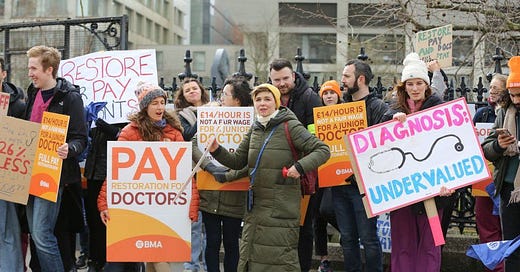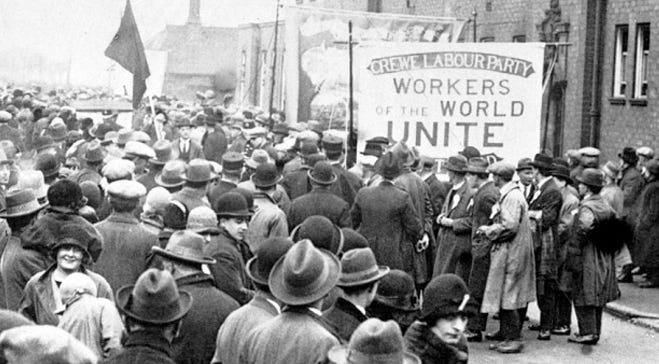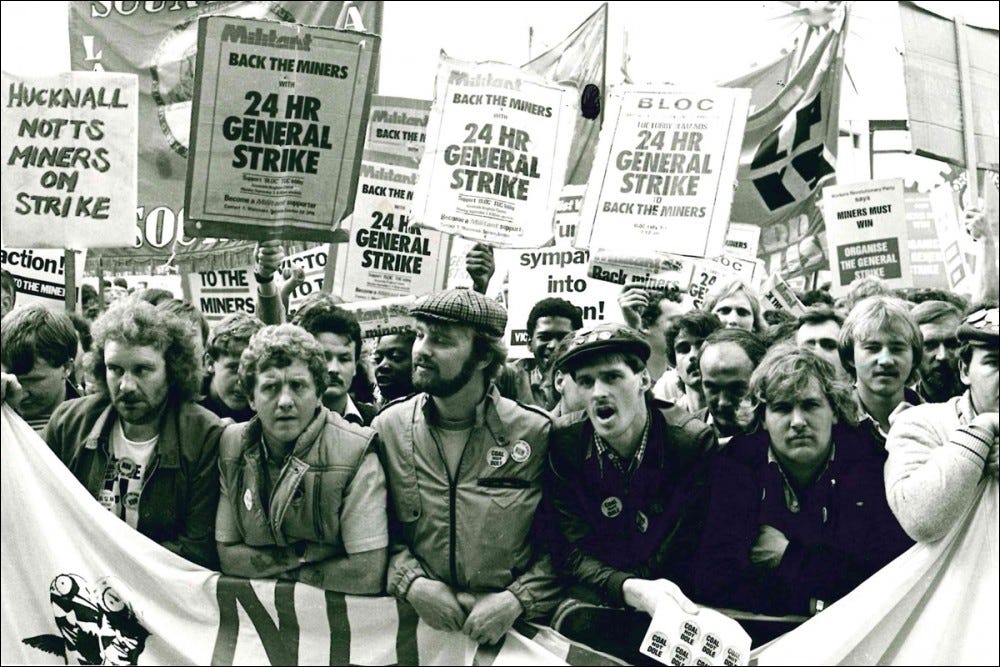As an NHS doctor, I’m currently on strike.
Seeing my fellow doctors holding placards was certainly refreshing as healthcare workers are more humanitarian than they are political.
I also want to say a special thanks to you all - physician associates, advanced nurse practitioners, physios, pharmacists and others. Without your support, we could never strike and we really do feel awful about the pressurised working conditions due to our absence over the last few days.
Over the past few months public sector workers have taken industrial action across the board. This is on the backdrop of years of pay freezes, real pay cuts and attacks on pension entitlements. I’ve been reading a fair bit about trade unions and industrial action in the UK so I thought I’d share some history and reflections:
Industrialisation around the 1800s really changed the face of Britain. Ownership of industry transferred from aristocrats to rich capitalists and the average labourer was really at their mercy. The 1832 Reform Act made things worse as it extended the right to vote only to company owners further leaving workers to work in terrible pay conditions.
The textile industry was growing and with this, the frustration of the workers. People started to take matters into their own hands and sought better working conditions, pay rises and benefits for their families but they were faced with repression. Large riots occurred such as the 1842 General Strike but trade unions, who were really in their infancy at the time really suffered. Individuals such as William Cuffay was arrested and put on trial for “levying war against the Queen” and was deported to Tasmania.
It was all a little excessive really..
Things changed dramatically in the early 1900s with the onset of socialism. Ideas introduced by thinkers like Marx and Engles gave British thinkers a new found confidence. Other movements such as the Suffragettes also confirmed a collective feeling of under representation by the state. The Labour government, who prided itself on representing the working class adopted trade unions wholeheartedly.
The Trade Union Congress (TUC) became an official voice and become a union of other smaller unions that represented unions in various jobs. The labour government at the time took bold steps such as nationalising industries such as coal, gas and electricity. They introduced protective measures such as the minimum wage, extension of pensions to family members and even appointed union leaders to government. This is when trade union membership and the right to industrial action had seen widespread support.
Things changed quickly and this was not just a Conservative problem. Successful Conservative and Labour governments have taken harsh stances on industrial action and unions. Union membership decreased overtime and legislation has been passed repeatedly that curbed the types of industrial action that can be taken.
Most recently, legislation was announced that workers had to “maintain minimum service levels” when considering industrial action. Recent prime minister Liz Truss proposed some of the harshest measures against trade unions which in the words of the RMT would “make effective trade unionism illegal in Britain.”
The miners strike in 1970s are a stark reminder of how things changed for unions and where things could possibly go. With coal becoming less profitable, the Conservative government at the time decided that closing some mines to retain profits was the best policy to pursue. The loss of jobs was not of government concern and the National Union of Miners called a national strike only for the government to adopt a harsh policy of “ignoring the miners.” The government had contingencies in place and the media, despite some slanderous reporting opted to largely ignore the strikes.
Now I’m not saying we’re going to lose our jobs but the toxic terminology adopted by government, current media silence about the strikes and the governments unwillingness to negotiate with teachers, doctors, nurses, emergency service workers and railway workers really does make us remember the policy pursued during the miners strike.
Trade unions may not be what they were but ultimately they are a representation of the collective voice we hold as professionals. We have given our time, energy, blood, sweat and tears to the NHS. We worked relentlessly during the pandemic - risking our lives for the welfare of others and continue to face an onslaught on our national health service only for us to be made to feel embarrassed for wanting to be properly financially remunerated?
We must ensure that we are not ignored and that we make our voices heard. We are ultimately a multi-disciplinary team and we should stand in solidarity with all of our colleagues.
Let’s hope that our actions can correct this “amnesia” the government has for our sacrifice.
Written Masterclass
If you’re a physician associate due to sit your national OR local examinations or know anyone who is then consider signing up to our written masterclass. Surprising, a larger percentage of students failed their last national written exam which makes this course all the more worthwhile.
It will be a one day course priced at an affordable £29 so will certainly be worth your time and money. All attendees will also received a pack of learning resources to help support their learning. Sign up here.
Please like & share
Check us out on our various pages
Website: www.paretoeducation.co.uk
Instagram: www.instagram.com/pareto_ed
Twitter: www.twitter.com/pareto_ed
Youtube: https://bit.ly/3DPm23c
Email: paretopaeducation@gmail.com







